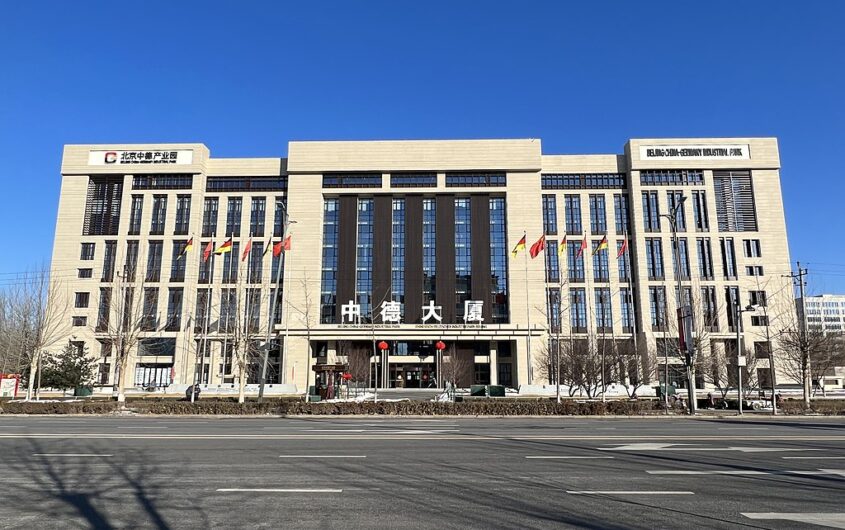
N509FZ via Wikimedia Commons
Robert Habeck in China

Yixiang Xu
China Fellow; Program Officer, Geoeconomics
Yixiang Xu is the China Fellow and Program Officer, Geoeconomics at AGI, leading the Institute’s work on U.S. and German relations with China. He has written extensively on Sino-EU and Sino-German relations, transatlantic cooperation on China policy, Sino-U.S. great power competition, China's Belt-and-Road Initiative and its implications for Germany and the U.S., Chinese engagement in Central and Eastern Europe, foreign investment screening, EU and U.S. strategies for global infrastructure investment, 5G supply chain and infrastructure security, and the future of Artificial Intelligence. His written contributions have been published by institutes including The Chinese Academy of Social Sciences, The United States Institute of Peace, and The Asia Society's Center for U.S.-China Relations. He has spoken on China's role in transatlantic relations at various seminars and international conferences in China, Germany, and the U.S.
Mr. Xu received his MA in International Political Economy from The Josef Korbel School of International Studies at The University of Denver and his BA in Linguistics and Classics from The University of Pittsburgh. He is an alumnus of the Bucerius Summer School on Global Governance, the Global Bridges European-American Young Leaders Conference, and the Brussels Forum's Young Professionals Summit. Mr. Xu also studied in China, Germany, Israel, Italy, and the UK and speaks Mandarin Chinese, German, and Russian.
__
Germany’s Continuing China Policy Inertia
When German Vice Chancellor and Economics Minister Robert Habeck called for a unified European strategy to stand up against competition with China at the end of his recent visit to Beijing, he was not only drawing attention to the urgent need for European cohesion but also the outsized and often defiant role his own country continues to play inside the EU’s China policy discussions. Berlin is frequently criticized by other member states as placing Germany’s short-term national economic priorities over collective concerns, a practice that frustrates the realization of an effective European Union-wide China policy.
The Ministry for Economic Affairs and Climate Action’s press release for Habeck’s trip succinctly summarizes Germany’s self-interests. It states, “China is of great importance for many German companies as a production base, innovation center, and procurement and sales market.” This is a well-rehearsed policy conviction that propels the German chancellor Olaf Scholz’ China policy, which continues to cultivate trade and investment relations with the People’s Republic despite the coalition government’s own public criticism of Beijing’s market-distortive behaviors and advocacy for structural changes to reduce Germany’s economic dependence on China. The document that details Berlin’s discontent with the status quo of the bilateral economic relations is Germany’s 2023 China strategy, in which the government also vowed to de-risk from China.
A year later, those goals have achieved little progress. According to a recent report by the German Economic Institute, German import dependencies on China in 2023 remained roughly the same as the year before. Chemical products, electronics, mechanical engineering products, and minerals, which have been identified as posing strategic vulnerabilities for the German economy, significantly depend on Chinese imports.
German companies, from large international corporations to small-and-medium-sized enterprises, continue to be highly sensitive about perceived Chinese government retaliation and actively lobby their government to smooth over frictions with Beijing. The Chinese government is taking full advantage of German corporate anxiety in a bid to compel Berlin to play the role of “mediator” (调停人 tiao ting ren) between China and the EU, amid the latter’s decision to impose tariffs on imported Chinese EVs over Chinese government subsidies. On the one hand, the Chinese state press China Daily openly threatens that “if the tariffs are imposed, China and the EU will inevitably engage in trade wars, which will lead to catastrophic consequences.” On the other hand, Beijing is proposing lower tariffs on large-engine vehicles that would appeal to German luxury automakers and further harness their lobbying power in Berlin and Brussels.
China’s sticks and carrots aim to preserve Germany’s “mediator” role, in which the federal government throughout the Merkel years advocated and engineered Europe’s close trade relations with and economic dependency on China, This relationship was based on both the conventional wisdom of Germany’s export-oriented economic model and business calculations by a selection of German companies who benefited disproportionally from bilateral trade and investment ties with China compared to their European peers. German Minister of Transport Volker Wissing’s criticism of the EU Commission’s EV tariff decision from Shanghai on the heels of Habeck’s departure perfectly illustrated the impulse of invoking free market principles to preserve national commercial interests.
This suits China just fine. While Chinese officials and Chinese state media rail against the EU’s “protectionism,” Beijing really wants Brussels to acquiesce to a much narrower set of German business interests over the European Commission’s, as well as the German government’s, commitment to leveling the playing field in the EV and other strategic industries for the entire European single market. European governments are still welcome to pursue fair trade, but only if they are barred from the instruments to enforce it.
The only way that Germany will be able to enjoy the benefit of pursuing strategic competition with China with the aid of a unified European China policy will be if Berlin is willing to subordinate its own short-term commercial interests to collective medium-to-long-term objectives.
The kind of “German perspective” with which China wants to steer the EU’s trade policy will also subordinate some of Europe’s vital security interests, chiefly to resist and repel Russia’s armed invasion of Ukraine and its threat to the NATO alliance. Successive rounds of difficult EU sanctions negotiations aimed at depriving Putin’s regime of the necessary resources to sustain its aggression are grossly undermined by increased Chinese trade and investment with Russia. Yet again, Beijing can be reasonably confident that Scholz’ Zeitenwende pledge will not apply to Chinese interests. Just before Habeck traveled to China, the German government succeeded in watering down the EU’s fourteenth round of Russian sanctions in negotiation that would have prohibited subsidiaries in third countries from re-exportation to Russia.
Habeck’s call for an update to Germany’s China strategy during his visit to Beijing shows that not everyone in Berlin is guided by the country’s China policy inertia. His Green Party has consistently advocated for a strategic reorientation of Germany’s relationship with China. The Green-led Federal Foreign Office under Habeck’s party colleague Annalena Baerbock initiated the coalition’s efforts to formulate the current and Germany’s first China strategy and was responsible for many of its sober assessments of Germany’s strategic risks stemming from the People’s Republic as well as sensible pledges to de-risk and diversify from China. Other cabinet members such as Interior Minister Nancy Faeser (SPD) and Education and Research Minister Bettina Stark-Watzinger (FDP) have pushed for changes to reduce German vulnerabilities in areas including telecoms infrastructure and bilateral research collaborations.
However, acute disagreements between partners in the governing coalition, not only across ministries but also spanning ideological divides within and astride political parties, often ended with the chancellery coming down on the side of apologists and appeasers. Thus, contrary to the government’s professed desire to lead a major China policy transformation, many meaningful structural changes that would significantly alter the hitherto business rationale of closer trade and investment ties with China and compel reluctant, even recalcitrant, German businesses to de-risk from China alongside the federal government and their European peers failed to materialize.
An updated China strategy is not exactly what Germany needs to overcome its China policy inertia. A China strategy 2.0 may be reduced to a collection of inspirational slogans if its vision is not backed up by solid political capital as well as the requisite resources. Likewise, the only way that Germany will be able to enjoy the benefit of pursuing strategic competition with China with the aid of a unified European China policy will be if Berlin is willing to subordinate its own short-term commercial interests to collective medium-to-long-term objectives, which above all requires courageous leadership.








